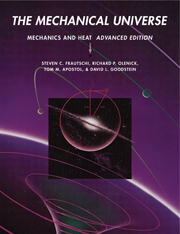Book contents
- Frontmatter
- Contents
- Preface
- Chapter 1 INTRODUCTION TO THE MECHANICAL UNIVERSE (Program 1)
- Chapter 2 THE LAW OF FALLING BODIES (Program 2)
- Chapter 3 THE LANGUAGE OF NATURE: DERIVATIVES AND INTEGRALS
- Chapter 4 INERTIA
- Chapter 5 VECTORS
- Chapter 6 NEWTON'S LAWS AND EQUILIBRIUM
- Chapter 7 UNIVERSAL GRAVITATION AND CIRCULAR MOTION
- Chapter 8 FORCES
- Chapter 9 FORCES IN ACCELERATING REFERENCE FRAMES
- Chapter 10 ENERGY: CONSERVATION AND CONVERSION
- Chapter 11 THE CONSERVATION OF MOMENTUM
- Chapter 12 OSCILLATORY MOTION
- Chapter 13 ANGULAR MOMENTUM
- Chapter 14 ROTATIONAL DYNAMICS FOR RIGID BODIES
- Chapter 15 GYROSCOPES
- Chapter 16 KEPLER'S LAWS AND THE CONIC SECTIONS
- Chapter 17 SOLVING THE KEPLER PROBLEM
- Chapter 18 NAVIGATING IN SPACE
- Chapter 19 TEMPERATURE AND THE GAS LAWS
- Chapter 20 THE ENGINE OF NATURE
- Chapter 21 ENTROPY
- Chapter 22 THE QUEST FOR LOW TEMPERATURE
- Appendix A THE INTERNATIONAL SYSTEM OF UNITS
- Appendix B CONVERSION FACTORS
- Appendix C FORMULAS FROM ALGEBRA, GEOMETRY, AND TRIGONOMETRY
- Appendix D ASTRONOMICAL DATA
- Appendix E PHYSICAL CONSTANTS
- SELECTED BIBLIOGRAPHY
- Index
Chapter 11 - THE CONSERVATION OF MOMENTUM
Published online by Cambridge University Press: 05 August 2013
- Frontmatter
- Contents
- Preface
- Chapter 1 INTRODUCTION TO THE MECHANICAL UNIVERSE (Program 1)
- Chapter 2 THE LAW OF FALLING BODIES (Program 2)
- Chapter 3 THE LANGUAGE OF NATURE: DERIVATIVES AND INTEGRALS
- Chapter 4 INERTIA
- Chapter 5 VECTORS
- Chapter 6 NEWTON'S LAWS AND EQUILIBRIUM
- Chapter 7 UNIVERSAL GRAVITATION AND CIRCULAR MOTION
- Chapter 8 FORCES
- Chapter 9 FORCES IN ACCELERATING REFERENCE FRAMES
- Chapter 10 ENERGY: CONSERVATION AND CONVERSION
- Chapter 11 THE CONSERVATION OF MOMENTUM
- Chapter 12 OSCILLATORY MOTION
- Chapter 13 ANGULAR MOMENTUM
- Chapter 14 ROTATIONAL DYNAMICS FOR RIGID BODIES
- Chapter 15 GYROSCOPES
- Chapter 16 KEPLER'S LAWS AND THE CONIC SECTIONS
- Chapter 17 SOLVING THE KEPLER PROBLEM
- Chapter 18 NAVIGATING IN SPACE
- Chapter 19 TEMPERATURE AND THE GAS LAWS
- Chapter 20 THE ENGINE OF NATURE
- Chapter 21 ENTROPY
- Chapter 22 THE QUEST FOR LOW TEMPERATURE
- Appendix A THE INTERNATIONAL SYSTEM OF UNITS
- Appendix B CONVERSION FACTORS
- Appendix C FORMULAS FROM ALGEBRA, GEOMETRY, AND TRIGONOMETRY
- Appendix D ASTRONOMICAL DATA
- Appendix E PHYSICAL CONSTANTS
- SELECTED BIBLIOGRAPHY
- Index
Summary
And with respect to the general cause, it seems manifest to me that it is none other than God himself, who, in the beginning, created matter along with motion and rest, and now by his ordinary concourse alone preserves in the whole the same amount of motion and rest that he placed in it. For although motion is nothing in the matter moved but its mode, it has yet a certain and determinate quantity, which we easily see may remain always the same in the whole universe, although it changes in each of the parts of it.
René Descartes. Principles of Philosophy (1644)THE UNIVERSE AS A MACHINE
The seventeenth century was the century when science assumed its modern form and the scientific spirit infected Europe. It was the time when Aristotle's view of nature was rejected and Galileo's great book of the universe was adopted. The new science was nourished by an optimism that mankind could discover the laws of nature.
One of the most significant and influential figures in seventeenth-century natural philosophy was René Descartes. Early in his life, Descartes rebelled against the traditions in which he had been thoroughly educated. He sought new foundations for knowledge, foundations which could underpin certainty in our knowledge of nature. Convinced of the indubitable logic of mathematics, Descartes came to identify mathematics with physics.
- Type
- Chapter
- Information
- The Mechanical UniverseMechanics and Heat, Advanced Edition, pp. 263 - 294Publisher: Cambridge University PressPrint publication year: 1986



